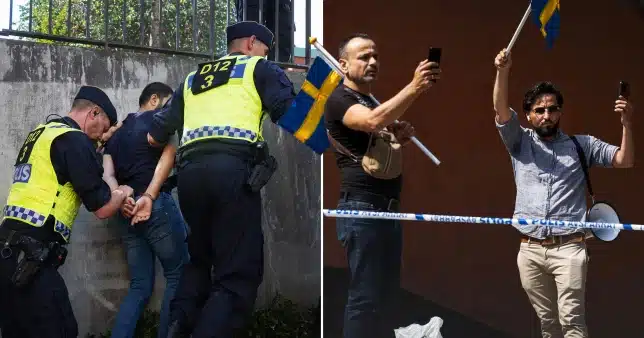Anger following Sweden‘s approval of demonstrators tearing apart and burning the Quran outside of a mosqueWidespread criticism has been directed at the Swedish government’s decision to permit two men to conduct a divisive protest in front of a mosque.
Salwan Momika, who is believed to be an Iraqi living in Sweden, tore pages off a Quran, wiped his shoes on them, and then covered the book in bacon before setting it on fire.
Yesterday, about 200 people observed as another man stood next to him outside Stockholm’s main mosque.
One man was detained by police as he attempted to throw a rock, while others of the attendees screamed “God is Great” in Arabic in protest of the burning.
Swedish authorities granted permission for the protest to go ahead and the burning of the holy Islamic text has been heavily criticised by Muslim-majority nations.
Muslims consider the Quran the sacred word of God and any intentional damage or show of disrespect towards it is considered extremely offensive.
Prime minister Ulf Kristersson said the protest, which coincided with the beginning of one of the most important Muslim holidays of Eid al-Adha, was ‘legal but not appropriate’.
However, a 37-year-old man has now been charged by police with agitation against an ethnic or national group following the incident.
Middle Eastern nations including Iraq, Iran, Saudi Arabia and Egypt have voiced their strong disapproval of the protest.
Iraq said it was ‘a reflection of a hateful aggressive spirit that has nothing to do with freedom of expression’.
Demonstrators have also broken into the Swedish embassy in Baghdad following orders from Shia cleric, Muqtada al-Sadr, who called for the expulsion of the Swedish ambassador in the city.
Some protesters were seen climbing over a barricaded wall outside the embassy and were understood to have been inside for around 15 minutes before they left, reports CNN.
Egypt described it as a ‘shameful’ act, while Iran labelled it ‘provocative’ and ‘unacceptable’.
Turkish foreign minister Hakan Fidan slammed a ‘despicable, atrocious act’ and said it was ‘unacceptable to allow these actions under the pretext of freedom of expression’.
Turkey is one of the NATO countries with a say over whether Sweden gains membership but Mr Kristersson said he would not speculate about how the protest could impact the process.
Sweden sought NATO membership in the wake of Russia’s invasion of Ukraine last year but alliance member Turkey has held up the process, accusing Sweden of harbouring people it considers terrorists and demanding their extradition.
Vedant Patel, deputy spokesperson for the US State Department, said burning of religious texts is ‘disrespectful and hurtful’.
He told reporters at a daily briefing: ‘What might be legal is certainly not necessarily appropriate.’
But he continued to urge Turkey and Hungary to approve Sweden’s NATO status and added: ‘We believe Sweden has fulfilled its commitments under the trilateral memorandum.’
Swedish police have rejected several recent applications for anti-Quran demonstrations, but courts have overruled those decisions, saying they infringed on freedom of speech.
Mosque director Imam Mahmoud Khalfi said he was disappointed by the decision to grant permission for the protest during Eid al-Adha.
He said: ‘The mosque suggested to the police to at least divert the demonstration to another location, which is possible by law, but they chose not to do so.’
Up to 10,000 visitors attend Stockholm’s mosque for Eid celebrations every year, according to Mr Khalfi.
In January this year, Turkey suspended talks with Sweden on its NATO application after a Danish far-right politician burned a copy of the Quran near the Turkish embassy in Stockholm.

